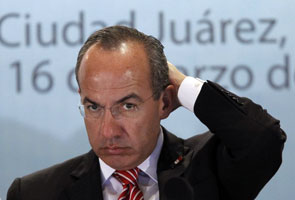18 March 2010 Edition
Mexico's war on drugs

Mexican president Felipe Calderon
BY DARA MAC NEILL
Slowly but surely, the modern state of Mexico is collapsing, imploding under the weight of its own corruption and contradictions, awash with drug money and feuding drug empires. It has followed the bloody path taken by Colombia and become a 21st century ‘narco-state’.
The Mexican border town of Ciudad Juarez sits across the Rio Grande from El Paso, in Texas. It is a major north-south transit point, with upwards of 60,000 people crossing the border daily.
It is this fact that has made Juarez a focal point of the multi-billion cross border drug trade and the murder capital of the modern world. Mexico ‘earns’ in excess of €60 billion per annum from this very modern trade.
Last year, Juarez bore witness to 2,657 murders. In early February, 16 teenagers attending a party were massacred by gunmen. It now seems they got the address wrong. Just three months into 2010, Juarez looks certain to overtake last year’s bloody toll.
Since December 2006, when Felipe Calderon assumed the Mexican presidency amid mass civil unrest and protests about the legitimacy of his electoral ‘victory’, the Mexican Drug War has claimed more than 19,000 lives. Calderon represents the conservative National Action Party (PAN).
All evidence suggests that he was fraudulently elected and that the real victor was left leaning Andrés Manuel López Obrador. The Federal Electoral Tribunal accepted there had been voting irregularities, but after two Tribunal members reversed their positions, Calderon was declared the victor by 0.56 percent of the votes cast. Even today, many Mexicans do not see the Calderon Presidency as legitimate, including the current elected Mayor of Mexico City.
And like many a leader of dubious legitimacy in the past, Calderon’s first action was to declare war. On drugs. And so the Mexican state entered into armed and open combat with the powerful cartels, when it is clear that the very officers of that state – legal, judicial, military, political – sell protection to different cartels at different times.
As in Colombia, the political and drug dealing classes are deeply enmeshed with each other. In terms of Mexico’s future viability, there is also another worrying parallel with Colombia – the growing involvement of the United States military and judicial authorities. Experts now believe there may be hundreds of US military and police personnel ‘on the ground’ in Mexico.
This is highly sensitive in a country that has repeatedly been invaded by its neighbour to the North and has seen half its territory annexed – California, Arizona, Texas: “Poor Mexico,” the old saying goes, “so far from God, so close to the United States.”
Last weekend two US Consulate staff and another with work connections to the office were shot dead in Jaurez.
And as in Colombia, there are strong suspicions in Mexico that the slaughter on its streets results less from domestic priorities than from the concerns of Washington.
Their southern neighbour has Plan Colombia – the multi-billion dollar military aid programme that props up the Colombian narco state under the guise of a counter-insurgency plan. It is driven as much by the strategic considerations of the Pentagon as by the needs of the Uribe regime.
And Mexico has the Merida Initiative signed in the city of that name by George W. Bush and (not the) President Calderon. The aid Mexico receives has strings attached, strings that bind the country’s rulers closer to Washington. The Merida Initiative is already referred to derisively as Plan Mexico.
Both Colombia and Mexico are virtually Washington’s last remaining allies in Latin America, a continent that no longer takes direction from the White House and is forging an increasingly independent role, with regional powers like Brazil assuming an ever larger role on the world stage.
Plan Colombia and ‘Plan Mexico’ guarantee the Pentagon a continued military and strategic presence in the region. The power of Mexico’s cartels has grown exponentially since 1994, when the country’s embrace of the neoliberal project culminated in the North American Free Trade Agreement (NAFTA).
There was an initial influx of jobs as major US corporations decamped south to take advantage of the lower wages and less stressful conditions for capital. Now most of those jobs have gone further south or to China, chasing even lower wages.
And Mexico’s agriculture has been decimated by a flood of cheap imported food and subsidised grain from the US and Canada. Now at least half a million Mexicans earn their living in the drugs economy, while millions more depend on it for a living.
Which gives rise to the question: Can Mexico afford to close down the drug economy?
The U.S. State Department has estimated that Mexico’s drug exports account for 22 percent of the country’s total exports to the U.S. Were that to shut down, it could collapse the entire Mexican economy. What country will voluntarily do that?


